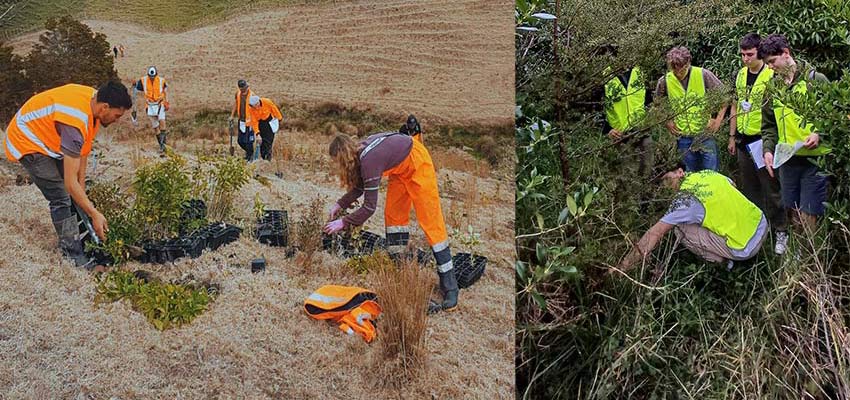Living Laboratories
The AUT Living Laboratories programme has established three long-term experimental restoration sites to demonstrate the value of, and to inform the practice of, Nature-based Solutions (NbS).
These sites are located at Pourewa in partnership with Ngāti Whātua Ōrākei, Te Muri Regional Park in partnership with Ngāti Manuhiri and Auckland Council, and Pūkorokoro/Miranda in partnership with Ngāti Pāoa and Te Whangai Trust.
What are Nature-based Solutions?
NbS are actions that work with, or mimic, nature to produce solutions to critical challenges such as climate change and biodiversity loss. The AUT Living Laboratories programme currently focuses on revegetation of retired farmland, but NbS includes other forms of ecosystem restoration such as wetlands, estuaries, coastal habitats, sea grasses, kelp forests and so on. Nature-based Solutions were recently highlighted as a critical lever for climate action in Aotearoa New Zealand, both the Emissions Reduction Plan and the draft National Adaptation Plan.

What are the long-term objectives of the AUT Living Laboratories programme?
Our aspiration is to support the use of Nature-based Solutions to promote climate-resilience for Aotearoa’s rural landscapes. To do this, we are generating knowledge about how to successfully, cost-effectively, and rapidly establish late successional forests within the Hauraki Gulf catchment, in a way that enhances the mana for local iwi and hapū. The ‘research-teaching-community nexus’ is a foundational framework for the AUT Living Laboratories: the experimental sites have become outdoor research and teaching ‘laboratories’ for AUT staff and students, but have also facilitated community engagement with schools, whānau and community groups, including farmers. This outreach will help us to build restorative economies over time which have the will and capability to protect, restore, manage and create natural ecosystems. Ultimately, by generating practical research-based methods, evidence, and knowledge, and by demonstrating their applications, the AUT Living Laboratories aspires to impact land management and biodiversity policy in Aotearoa.
AUT Living Laboratories Research Programme – open for collaboration
Our three experimental sites are intensively monitored to generate new knowledge about the wider ecosystem effects of revegetation, such as biodiversity improvements, carbon sequestration, soil and water quality, and more. Since the project inception in 2019, more than 15 MSc and PhD students have contributed to the research goals of the programme.
The programme is open to collaborations in science, social science and multi-disciplinary research both external and internal to AUT and is supported by Whakatupu Aotearoa.
Learning from Nature
The AUT Learning from Nature programme teaches environmental research skills and environmental education to students of every level. The aim is to provide a long-term teaching and research resource, utilising the restoration of native forests and land in Aotearoa. In this way, the programme introduces environmental science education to students around Tāmaki Makaurau, and builds core values relating people to place. The Learning from Nature programme hosts a number of school visits through Te Pourewa. We cater to a range of scientific learning outcomes at different academic levels.
It is a flexible source of knowledge that can cater lessons to the learning outcomes that your school is teaching in class.
We also open our restoration sites to science researchers, community groups, and local schools for research and education. We value open-air classroom kaupapa, hands-on education, and teaching students practical skills and ecological understanding. We want to establish a positive connection between students and their environment, and we try to make sure every student leaves knowing that their native environment is sacred, important, and fun!

What students can do
- Learn about the site history and context, bringing mana whenua Ngāti Whātua Ōrākei to the forefront of science research
- Native tree identification games
- Participate in invertebrate sampling and identification
- Participate in environmental field skills activities (i.e. learning how to properly measure plants)
- Learn how to conduct bird counts
- Chat with the real-life scientists who assist with school visits